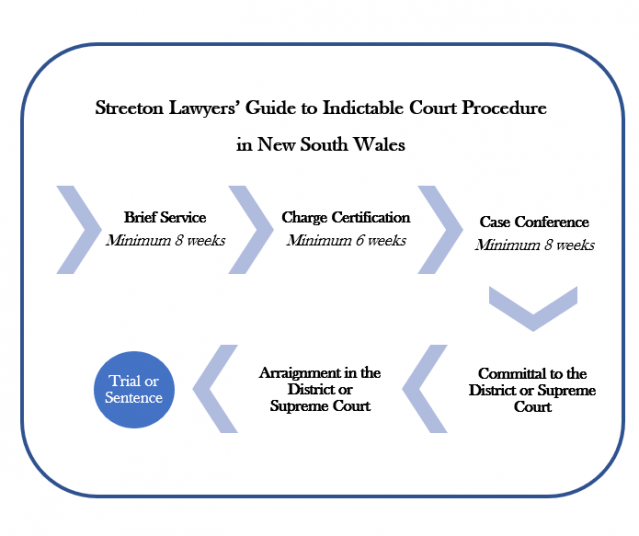If you are charged with a serious criminal offence that is “strictly indictable” or where the prosecution elects to deal with your matter “on indictment“, your matter will follow a fixed process through the Local Court before it is moved to the District or Supreme Court to be finalised.
This process is much longer than the process for less serious, or “summary”, criminal offences that are finalised in the Local Court.
These are the steps in the process:
1. Criminal charges are laid
2. Brief Service
- On the first court date, your matter will be adjourned for 8 weeks for the Police to compile and serve the Brief of Evidence.
- The brief will normally be served towards the end of the 8-week period.
- If the brief is not sufficiently complete after 8 weeks, the Court may grant another adjournment of 8 weeks for a further brief service. This can happen more than once in a complex matter.
3. Charge Certification
- Once the brief is complete, the matter will be adjourned for 6 weeks for charge certification.
- A solicitor in the Office of the Director of Public Prosecutions or the Commonwealth Director of Public Prosecutions will be assigned to your case.
- A senior prosecutor will review the evidence against you and certify the final charges against you.
- It is very common for charges to be withdrawn, replaced or added during this stage.
4. Case Conference
- After the charges have been certified, your matter will be adjourned for 8 weeks for a case conference to occur.
- This is a mandatory negotiation between the prosecution and the defence, during which the parties discuss whether your matter can be resolved without a trial.
- If you do not want to negotiate, your lawyer still has to attend the case conference but they do not have to make or accept any offers.
- You will not be present in this conference but you will need to be available by phone.
5. Committal
- After the case conference stage has been completed, you will be required to enter your pleas of guilty or not guilty to the charges.
- Your matter will then be committed to the District Court or Supreme Court for a mention about a month later.
- From this point onwards, your matter will leave the Local Court and be dealt with in the District or Supreme Court.
6. Arraigment
- On the first mention in the District Court or Supreme Court, you will be arraigned. This is when you need to formally enter your pleas of guilty or not guilty.
- If you plead guilty, your matter will be listed for a sentencing hearing.
- If you plead not guilty, your matter will be listed for a trial.
7. Trial or Sentence
- A trial is where a jury (or in some cases, a judge) hears all the evidence and decides whether you are guilty or not guilty.
- A sentence occurs if you plead guilty or are found guilty after a trial. This is where a judge decides what the appropriate penalty should be for your offending.
